Iran's President Will Reportedly Attend Islamic Meeting In Riyadh
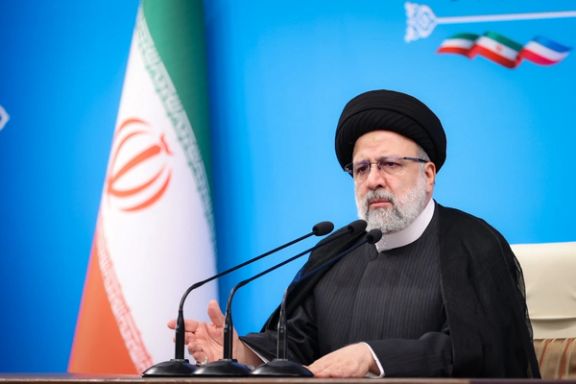
Iranian President Ebrahim Raisi will travel to Saudi Arabia on Sunday, the first such visit since Tehran and Riyadh agreed to revive diplomatic ties in March.

Iranian President Ebrahim Raisi will travel to Saudi Arabia on Sunday, the first such visit since Tehran and Riyadh agreed to revive diplomatic ties in March.
"President Raisi will attend the Organization of Islamic Cooperation' (OIC) summit in Riyadh, where the issue of Palestine will be discussed," Etemadonline news website in Tehran reported.
World and regional powers have failed to reach any consensus on how to deal with the escalating conflict in the four weeks since fighters from Hamas militants stormed southern Israel on October 7, killing some 1,400 Israelis, mainly civilians, and taking more than 240 people hostage.
The Iranian regime, which has provided financial and military support to Hamas over the years, immediately celebrated the terror attack, but has avoided direct involvement.
Israel has since struck Hamas-controlled Gaza from the air, imposed a siege and launched a ground assault, stirring global alarm over humanitarian conditions in the enclave. At least 10,022 Palestinians, including 4,104 children, have been killed so far in Israeli strikes on Gaza since Oct. 7, the Gaza health ministry said on Monday.
Regional rivals Tehran and Riyadh agreed to resume ties in March under a deal negotiated by China after seven years of hostility, which had threatened stability and security in the Gulf and helped fuel conflicts in the Middle East from Yemen to Syria.
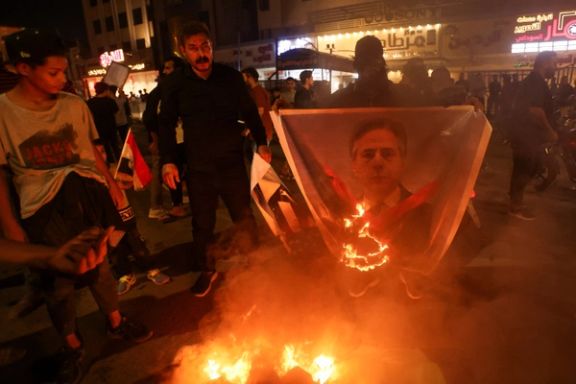
While the Gaza war continues, Iran avoids direct involvement, but continues blaming the United States, as its proxy forces launch attacks against US bases in the region.
Secretary of State Antony Blinken made it clear on a visit to Iraq during a regional tour, that threats from Iran on US assets in the region will be countered, with the backing of the Iraqi government.
Iran-backed Hamas invaded Israel killing 1,400 mostly civilians on October 7, and took at least 241 more hostages into the Gaza Strip.
While the US was quick to voice its support for Israel, backing its right to defend itself and offering military support, Iranian proxies have not only stepped up their attacks on Israel’s borders, but the US has also come under fire in the region.
Over 38 attacks have taken place against US facilities, seeing at least 46 personnel injured, in Syria and Iraq. The US has responded only once, leaving the Biden administration open to accusations of weakness, once again.
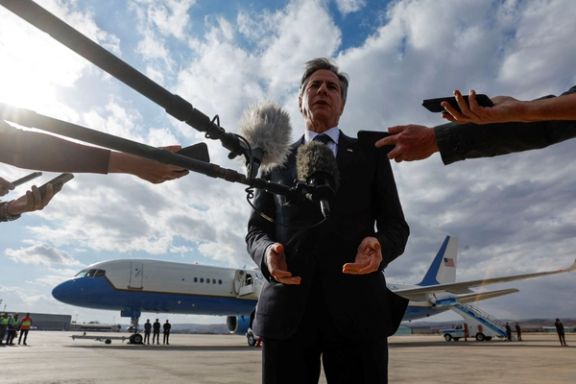
Two US fighter jets struck weapons and ammunition facilities used by Iran’s Revolutionary Guard Corps and its militia groups in Syria, the Pentagon warning the US will take additional measures if attacks by Iran's proxies continue.
Blinken sent a message to “anyone who might seek to take advantage of the conflict in Gaza to threaten our personnel here or anywhere else in the region: Don’t do it.”
Unabashed, he spoke directly to Tehran. “I made it very clear that the attacks, the threats coming from the militia that are aligned with Iran, are totally unacceptable and we will take every necessary step to protect our people.
“We’re not looking for conflict with Iran – we’ve made that very clear – but we’ll do what’s necessary to protect our personnel, be they military or civilian,” he said, claiming Iraq’s premier, Prime Minister Mohammed al-Sudani, was supportive.
However, following a meeting between al-Sudani and Iran’s supreme leader, Ali Al Khamenei in Tehran, the message looked somewhat more complex.
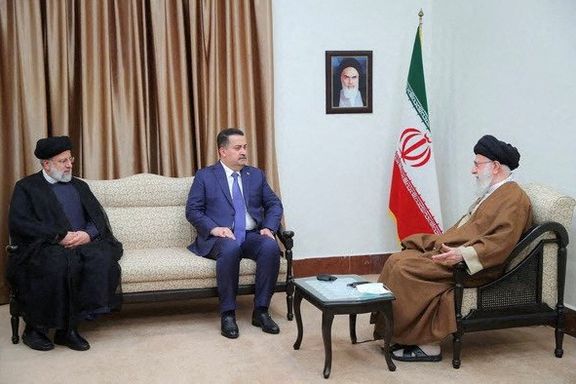
Khamenei, who has also met in recent days with Hamas’ political leader in exile, Ismail Haniyeh, met with the Iraqi premier, also a Shia muslim, in a bid to hedge support.
“As an important country in the region, Iraq can play a major role in putting political pressure on the US and the occupying regime to stop the massacre of people in Gaza and also in starting a new approach in the Arab and Muslim world,” he wrote on X, as the regime continues to draw the US into the fire.
In no uncertain terms, the regime is doing its utmost to blame the US as the Gaza war offers hope to finally bait the bear. "The longer the current war goes on, the evidence showing the direct role of the US in directing the crimes of the Zionist regime in Gaza becomes more pronounced,” he said on Monday.
Speaking on CNN, former national security advisor to ex-President Donald Trump, John Bolton, criticized Biden for calling for a humanitarian ceasefire in Gaza, supporting Israel’s argument that it will only allow the group, proscribed by countries including the US and UK, to regroup.
“The Biden admin is sliding away from its support of Israel. Nobody has taken into account how Hamas and its puppet masters in Tehran are manipulating public opinion in the US and elsewhere,” he said.
He said that not only is one of America’s closest allies under multiple attacks and threats of attacks by what he calls “a coalition of some of America’s greatest enemies”, he said the conflict is “extraordinarily serious”.
“This isn't about the Gaza Strip, it’s about the survival of Israel and threats to the United States,” he said. While the fears of conflict escalating beyond Israel and Gaza are at the top of the global agenda, Bolton said “the conflict has already spread”, blaming Iran for its being at the root of the escalation.
“There is no doubt here that Iran has called the shots from the beginning. We don’t know what their full strategy is but the center of this conflict is with the mullahs in Tehran,” he said. Attacks on Israel have come from Iran-backed proxies in Lebanon, Syria, Yemen and Iraq.
Slamming the lack of action by the Biden administration in the face of mounting aggression, he said Biden’s deterrence tactics had failed as attacks continue.
“If Iranian surrogate groups kill Americans, the Iranians need to pay a price for it. They don’t take our restraint as a good will gesture, they take it as a weakness,” Bolton said.

The Israeli military welcomed the deployment of a US nuclear missile submarine to the region amid the ongoing war in Gaza.
Israel Defense Forces' spokesperson Lieutenant-Colonel Richard Hecht called it "good news" to see the US support coming into the area, having a "stabilizing" effect on the region amidst Israel's war on Iran-backed Hamas in the Gaza Strip.
The US military announced on Sunday that the Ohio-class submarine has been deployed to the US Central Command's area of responsibility, which includes the Middle East as part of its efforts to support Israel in its war against Hamas.
The war, which began after a Hamas invasion of Israel on October 7, has since seen Iran's proxies in the region attacking US facilities, with around 20 US personnel injured.
Iranian proxies in Lebanon, Syria, Yemen and Iraq have targeted Israel since the Hamas invasion which was the single most deadly day for Jews since the Holocaust, seeing 1,400 mostly civilians murdered and 241 taken hostage.
The submarine deployment also follows aircraft carrier deployments in addition to 2,000 Marines to the region. Around 30 attacks have been carried out against US assets in Iraq and Syria, with just one retaliation from the US as the Biden administration attempts to appease Iran.
This week, secretary of state Antony Blinken, made a clear statement to Iran: “We’re not looking for conflict with Iran – we’ve made that very clear – but we’ll do what’s necessary to protect our personnel, be they military or civilian,”
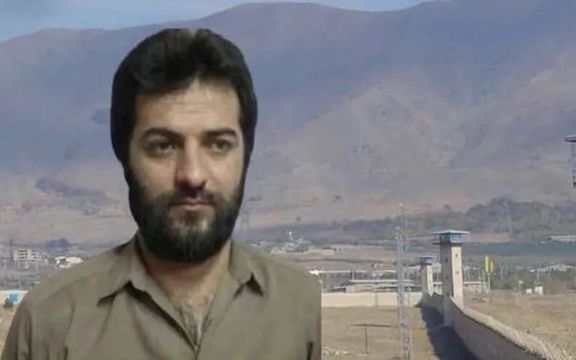
Qasem Abasteh, an Iranian Sunni prisoner, was executed in a prison near Tehran during the early hours of Monday.
The 44-year-old was transferred to the special unit within the prison to carry out the execution order last week.
Following Abasteh’s transfer to solitary confinement, a group of political prisoners detained at Ghezel Hesar prison issued a public call to prevent his execution.
In their letter, they emphasized the absence of a fair trial, stating, "We cannot allow the current circumstances and the escalating regional tensions to provide an opportunity for the execution of a fellow countryman and a government-sponsored killing."
Ahmadreza Haeri, a political prisoner, wrote from prison, "The entire trial did not last more than two minutes. Judge Moghiseh said first, you are a Kurd! Second, you are Sunni! Third, you have Salafi beliefs! These are the three reasons for the execution."
Abasteh, a father of two from Mahabad, was detained in December 2009, along with six other Kurdish citizens, by security forces, amid ongoing oppression of Kurdish Iranians.
In 2015, the Sunni inmates were tried by Judge Mohammad Moghiseh, the head of Branch 28 of the Tehran Revolutionary Court and sentenced to death. The sentences were confirmed by the Supreme Court in 2020, after years of legal wrangling. In September 2020, their request for a retrial was rejected by the Supreme Court.
They were accused of various charges, including "War against God," "corruption on earth," "support for Salafi groups," and the "murder" of Abdolrahim Tina, who was killed by unidentified assailants in September 2008. However, in their numerous letters published by human rights organizations in recent years, the individuals denied any connection to the allegations.
With Abasteh’s execution, six other prisoners who were co-defendants with him are now at risk of execution.
In October alone, 78 prisoners were executed in Iran and in the first half of 2023, 354 were executed.
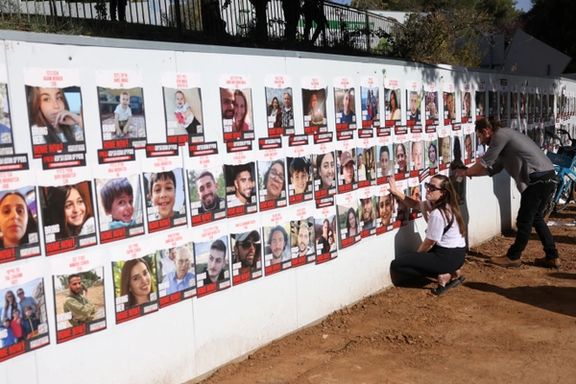
Iran denies involvement in the Hamas massacre of October 7, but a new report says the Islamist group postponed the attack upon coordination with Tehran.
Israeli journalist Ben Caspit said Sunday that Hamas's mass infiltration and onslaught leaving 1,400 mostly civilians dead and 241 hostages taken into Gaza, was originally intended to take place during last Passover's Seder meal Jewish holiday in April, which happened to coincide with Quds Day – an annual anti-Israel event initiated by the founder of the Islamic Republic, Rouhollah Khomeini.
According to the report, the Islamic Republic decided to delay the organized assault on civilians to Simchat Torah due to reasons that are unclear. However, Caspit speculated, it could have been postponed due to Tehran’s informal behind-the-scenes talks with the United States, which culminated in the release of Iran's oil revenues frozen in South Korea under US sanctions.
About $6 billion was freed up for Iran mid-September after Iran released five Iranian-Americans held in Tehran in exchange for five Iranians imprisoned in the US. Hamas declared war on Israel less than a month later. Iran openly supports Hamas and supplies military technology, training and logistics for its so-called ‘resistance’ against Israel and even held celebrations for the attack but insists it had no role in it.

The extent of the regime’s involvement in the Hamas attack, if and when it is established, would likely inform the nature of the response from Israel and the United States. Many in Washington are already pushing for retaliatory measures, including re-freezing the $6 billion. US Senators have written to President Biden, demanding that access to the money (currently held in a Qatari bank) be denied.
Hamas’ attack on Israel has enraged US officials who had warned the Biden administration of the consequences of its lenient approach to the regime in Iran. “Make no mistake— Hamas's genocidal violence was partly enabled by Biden unfreezing billions of dollars to Iran,” Senator Ted Cruz said Tuesday.
Last year in an interview with Al Jazeera, Hamas chief Ismail Haniyeh publicly thanked Tehran for supporting it with $70 million to help it develop missiles and defense systems, saying the regime is the terror group’s biggest donor. Gabriel Noronha, a former special advisor for the Iran Action Group at the US Department of State, said last month, Iran was giving Hamas $100 million a year in 2017 and with the Trump administration's maximum pressure policy on Iran, the Islamist group had to adopt austerity measures, but today “Hamas is getting $350 million from Iran that is 93 percent of its budget.”
The information was uncovered during the interrogation of Hamas militants who participated in the October 7 massacre, codenamed operation al-Aqsa flood (storm in Persian). The US considers Iran "at least complicit” in the attack, the State Department said last month but insisted it had no evidence of Tehran's direct involvement. Caspit noted that the information "might not have reached decision-makers or passed a validity test. But it did reach the ears of interrogators.”
Elsewhere in his reports, Caspit said that the October 7 date was chosen partly due to its proximity to the 50th anniversary of the Yom Kippur War, a three-week armed conflict fought in October 1973 between Israel and a coalition of Arab states led by Egypt and Syria.
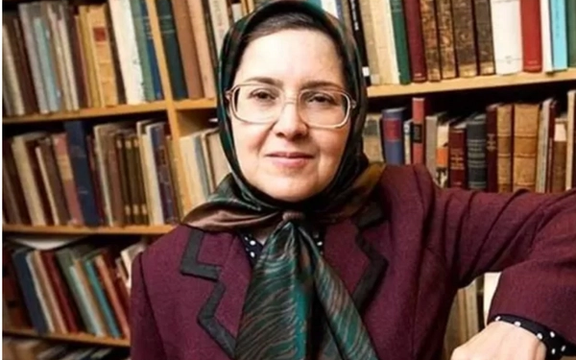
New details have emerged of the physical assault on mourners attending the funeral of 16-year-old Armita Geravand, who died after a confrontation with hijab enforcers.
Sedigheh Vasmaghi, a writer and Islam researcher, known for her stance against mandatory hijab, shared her experience after her arrest at the funeral on the Zeytoon website.
She said: "Two women were also among the attackers, dressed in uniform under their veils. The four assailants began their assault. One was shouting, one was trying to take my bag, and one was hitting me while uttering indecent language."
Referring to the death of Armita, a girl who, like Mahsa Amini, died in the hands of morality police, Vasmaghi added: "I asked them, 'You have taken one life, and her memorial is here. Do you intend to take mine here as well?' They forcibly dragged me for about ten to fifteen meters."
The burial and memorial service for Armita took place in Tehran last Sunday, with several more attendees arrested. Among them was also Nasrin Sotoudeh, a prominent human rights lawyer and activist, detainees all reportedly subjected to physical abuse during their apprehension.
On the day of the funeral, reports received by Iran International indicated that Vasmaghi was attacked by security officers after departing the ceremony. However, with the assistance of concerned citizens, she managed to escape the clutches of four male and female attackers.
Despite a week having passed since the assault by security forces, the status of some detainees remains unknown. Negar Ostad Agha, a journalist and senior editor at Etemad Online is currently detained in Gharchak Prison near Tehran, with no specific information available regarding her situation.